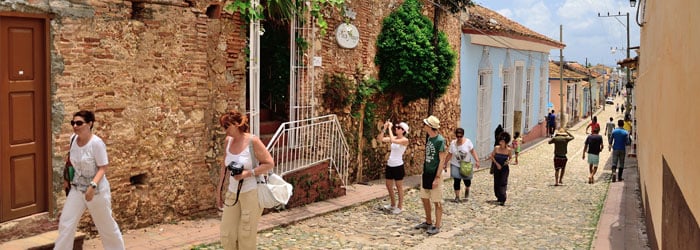Behind the Scenes: U.S. Travel to Cuba - Setting the Record Straight
People to People Travel to Cuba remains safe, educational, enjoyable and legal
When the Trump administration began rolling back the U.S. policy towards Cuba in June 2017, it caused uncertainty and fear among Americans interested in traveling to Cuba. It is also causing confusion among members of Congress, academic institutions, and travel providers. The new travel warning system does not address this misconception for Cuba, so further steps must be made.
The Center for Responsible Travel (CREST) has organized an initiative with the travel industry and educational partners so that lawmakers and U.S. State Department officials have a voice at the table. “As a CREST Board Member and an educational travel provider that has years of experience offering programs to Cuba, it is vital that we have a voice in helping shape travel policy to Cuba,” says Andrea Holbrook. “Cuba is a country that has so much to offer our community of travelers from an educational and nature-conservation standpoint. And it continues to be a safe place for US travelers. We also want our travelers to have a voice and that’s why we are so happy to support this CREST Cuba initiative.” CREST has created a “toolkit” for people-to-people travel. Holbrook Travel, along with other leading travel organizers, is part of an advocacy group to help communicate the current state of affairs.
The aim of the toolkit is to have travelers write or contact local media outlets, places of worship, civic organizations, and/or their members of congress with the broad message that people-to-people travel to Cuba is safe, beneficial, and educational, and that recent U.S. policy restrictions are unwarranted and hurting U.S. companies, educational institutions, and travelers, as well as the vibrant, household-based tourism businesses in Cuba.
Understanding Travel to Cuba Toolkit
Background:
The Trump administration’s rollback in U.S. policy towards Cuba, begun in June 2017, has caused uncertainty and a degree of fear among Americans interested in traveling to Cuba. It is also causing confusion among members of Congress, the media, academics, and tour operators.
In addition to the State Department’s ordered departure of non-essential staff from the U.S. Embassy in Havana and its expulsion of 15 Cuban diplomats from the Cuban Embassy in Washington, the Trump administration has announced several recent key changes related to travel to Cuba. They include:
-
A ban on individual, self-directed, non-sponsored “people-to-people” travel to Cuba. In addition, individual, undergraduate, student-research travel has also been effectively eliminated, and the category of “support for the Cuban people” has been extensively re-written and does not provide a simple substitute for the eliminated individual, people-to-people travel category.
-
A State Department Travel Warning against U.S. citizens visiting Cuba (now level 3 “Reconsider Travel”)
-
A list of 180 Cuban enterprises, ranging from hotels to soft drinks to flower shops, that American companies and travelers are prohibited from engaging with.
Toolkit - What You Can Do:
-
It is vital that those involved in travel to Cuba help to spread the word about legal travel to Cuba and correct the misinformation. Most people don’t know it’s still legal.
-
We’re encouraging everyone who has visited the island—tour operators, educational institutions, and individuals—to use the talking points below to contact policy makers, the media, and civic and community groups. Audiences could include, but are not limited to, members and staff of the U.S. Congress, newspaper and magazine reporters, bloggers, talk show hosts, businesspeople, faith-based groups, and fellow travelers and/or tour operators.
-
Whomever the audience, these talking points are designed to clarify the new rules and assert the belief that Americans should be free to travel wherever they want. The broad message we suggest you help to convey is that Cuba is safe and open for business and that the U.S. Government should return to the normalization process begun in 2014. In talking about why your travel to Cuba was important and special, you might consider incorporating some of the following talking points.
Talking Points from CREST toolkit:
-
Travel to Cuba is safe. While investigations into the health incidents impacting U.S. and some Canadian diplomats remain ongoing, there are no confirmed cases of other visitors (private citizens) having been similarly harmed. The United States is the only country in the world that restricts its citizens from traveling to Cuba.
-
Individual travel to Cuba is allowed in almost all the 12 general license categories of travel recognized by the Office of Foreign Assets Control of the U.S. Department of the Treasury (“OFAC”). These categories include visiting close relatives, educational activities, journalistic activities, U.S. religious organizations, private foundations, and research or educational institutes, among others.
-
However, one category – individual “people to people exchanges” – has been eliminated effective June 16th, 2017. This was one of the most important categories of general license travel allowing individuals to make their own arrangements on self-directed programs in Cuba.
-
Groups of all sizes can still travel to Cuba under the “people-to-people” category. Groups of any size (two people upwards) can visit Cuba if they are sponsored by a U.S. organization, have a full-time schedule of educational activities that result in meaningful interaction, and a U.S. employee, paid consultant, agent, or other representative of the sponsoring organization accompany each group.
-
Under certain conditions, all school trips—high school, university, and graduate—remain legal under the “educational” or “people-to-people” category. It is also legal to organize events and conferences under the “professional meetings” category, meaning companies can hold corporate retreats and U.S. associations can organize conferences. Religious, humanitarian and family travel remain legal as well.
-
S. travelers in Cuba provide an important source of revenue and other resources for Cuban entrepreneurs and household-based businesses as well as hotel, restaurant, and other service sector Cuban workers. Lifting travel restrictions to Cuba would be good for the U.S. economy. It would expand demand for U.S. products, help the travel and airline industries, and create American jobs.
-
When diplomatic and official government-to-government ties are strained, people-to-people interactions and educational travel are more important than ever. A majority of U.S. citizens support normalization of relations with Cuba. In December of 2016, a PEW Research poll showed that 75 percent of Americans approved of re-establishing U.S. relations with the island nation, and that 73 percent favor ending the U.S. trade embargo against Cuba.
-
There is bipartisan support for legislation to lift restrictions on American travel to Cuba in both the House and Senate. These bills are good for American businesses and good for the American and Cuban people.
Follow Up: Please be in touch with us
Holbrook Travel and others working with CREST appreciate any outreach done by our travel community to use this toolkit and communicate the situation in Cuba to support travel. If you do make use of these talking points while reaching out for advocacy purposes and/or sharing information with the media, please let us know whom you’ve contacted.



